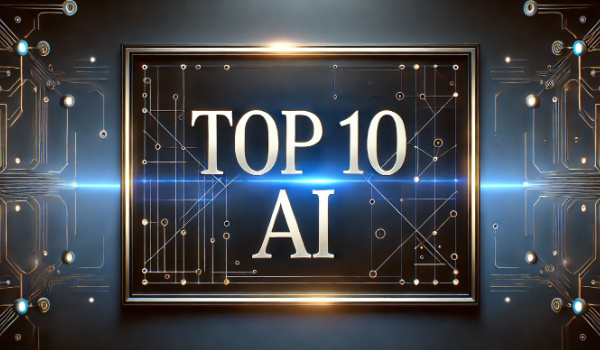Friends, the world of artificial intelligence continues to evolve at a breakneck pace (it feels redundant to say that but it’s true), with this past week delivering major breakthroughs, high-stakes business deals, and growing geopolitical tensions. Apple and Alibaba struck a deal to integrate AI into iPhones in China, while Elon Musk made waves by threatening to withdraw his $97 billion bid for OpenAI unless it returns to a non-profit model. Meanwhile, DeepSeek’s AI advancements gave a boost to China’s chip industry, sparking concerns in the U.S. As investors start questioning AI’s sky-high valuations, the industry faces increasing scrutiny, both legally and politically. Here’s a breakdown of the 10 most important AI stories from the past week:
Key Takeaways from the Week in AI:
-
Big Tech AI Moves & Business Deals – Apple partnered with Alibaba to bring AI to iPhones in China, while SoftBank positioned itself as OpenAI’s largest investor with a $40 billion stake. Meanwhile, Adobe launched Firefly AI Video Generator, aiming to be the most IP-compliant AI video tool.
-
Geopolitical AI Battles & Policy Shifts – DeepSeek’s AI is reshaping China’s chip industry, with the U.S. government debating new regulations to counter its rise. At the Paris AI Summit, global leaders clashed over AI governance, with the U.S. pushing for lighter regulation to maintain an industry edge.
-
AI’s Legal & Market Challenges – A landmark court ruling in Delaware raised concerns over AI training on copyrighted content, putting tech companies on alert. Meanwhile, AI stocks are facing skepticism, with analysts warning of potential market corrections due to overvaluation and inflated expectations.
Now let’s dive into the week’s top 10 stories, full of political and international implications!
The week of February 8 to February 13, 2025, witnessed significant developments in artificial intelligence (AI), encompassing major corporate partnerships, strategic policy decisions, and advancements in AI applications across various sectors. Below is a summary of the top 10 AI stories from this period:
1. Alibaba Partners with Apple to Integrate AI into iPhones in China
Alibaba announced a partnership with Apple to provide AI technology for iPhones sold in China. This collaboration aims to introduce advanced AI features to Chinese users, helping Apple compete with local smartphone manufacturers that have aggressively integrated AI capabilities. The deal comes amid regulatory requirements in China that necessitate partnerships with local firms for AI implementations.
FT.COM
2. Elon Musk Proposes Withdrawal of $97 Billion OpenAI Bid
Elon Musk proposed to withdraw his $97.4 billion bid to acquire OpenAI if the organization ceases its transition to a for-profit entity, aiming to preserve its original non-profit mission. This move follows a previously rejected bid and highlights ongoing tensions between Musk and OpenAI CEO Sam Altman. Musk, who co-founded OpenAI, has expressed concerns that the organization has shifted its focus toward profit-driven goals.
THETIMES.CO.UK
3. DeepSeek Enhances Position of Chinese Chipmakers in AI Development
The emergence of DeepSeek’s AI models has provided a competitive advantage to Chinese chipmakers, such as Huawei, in the domestic market against U.S. processor giants like Nvidia. DeepSeek’s focus on inference—where AI models produce conclusions—optimizes computational efficiency, helping to narrow the performance gap between Chinese-made chips and their U.S. counterparts. Several Chinese AI chipmakers have announced support for DeepSeek models, leveraging its open-source nature to foster AI development amid U.S. export restrictions.
REUTERS.COM
4. AI Stocks Face Legal Risks Following Federal Court Ruling
A federal court ruling in Delaware determined that Ross Intelligence, an AI startup, violated Thomson Reuters’ copyrights by indirectly using its content to train an AI product. This decision raises concerns about the legality of using copyrighted material for AI training and could have significant implications for the AI industry, which relies on large datasets that may include protected content. The ruling prompts questions about whether such training constitutes “fair use” and signals potential legal challenges for AI companies.
BARRONS.COM
5. U.S. Vice President Urges Allies to Maintain Light AI Regulation
At the AI summit in Paris, U.S. Vice President JD Vance encouraged American allies to adopt a light-touch approach to AI regulation to ensure the U.S. continues to lead the AI industry. This stance contrasts with other countries advocating for common principles to ensure safe and inclusive AI systems. The U.S. and the U.K. did not endorse a summit declaration aimed at promoting these goals, highlighting differing international perspectives on AI governance.
WSJ.COM
6. Paris AI Action Summit Highlights Global Policy Divergences
The Paris AI Action Summit, held on February 10-11, brought together global leaders, tech executives, and researchers to discuss AI governance. The summit aimed to address the ethical and democratic deployment of AI while managing associated risks. Notably, the U.S. and the U.K. declined to sign a joint declaration promoting responsible AI, underscoring differing approaches to AI regulation among major powers.
APNEWS.COM
7. Google and Poland Collaborate to Develop AI in Energy and Cybersecurity
Google and Poland signed a memorandum to develop the use of AI in the country’s energy and cybersecurity sectors. This collaboration aims to enhance Poland’s security and contribute to its economic growth, especially as the country reduces its dependence on Russian fuels and faces cyberattacks believed to be Russian-sponsored. Google also committed $5 million over five years to train young Poles in digital skills, targeting 1 million individuals.
APNEWS.COM
8. AI Industry Faces Potential Downturn Amid Investor Realism
Analysts caution that leading AI companies, including Nvidia, Tesla, and Palantir, could face significant stock declines as investors reassess the industry’s growth prospects. The rapid rise in AI valuations has led to concerns about potential overvaluation and the sustainability of current growth trajectories. Market observers suggest that a more realistic appraisal of AI’s capabilities and timelines may lead to market corrections.
FOOL.COM
9. AI’s Expanding Role in Cybersecurity and Emerging Risks
In 2025, AI is expected to play an increasingly critical role in cybersecurity, with advancements in generative tech, robotics, and automation reshaping various sectors. However, these developments also introduce new ethical challenges and risks, including the potential for AI-driven cyberattacks and the need for frameworks addressing digital bioethics and bio-cybersecurity. Experts emphasize the importance of establishing standards to ensure the safe integration of AI into various applications.
TECHNEWSWORLD.COM
10. Adobe Launches Firefly AI Video Generator
Adobe unveiled its Firefly AI video generator, positioning it as the most “IP-safe” AI tool to date. This innovation allows users to create videos using generative AI while ensuring that the content adheres to intellectual property rights. The launch reflects Adobe’s commitment to integrating AI into creative tools responsibly and may set new standards for AI-generated content in the industry.
VENTUREBEAT.COM
These developments underscore the dynamic and rapidly evolving landscape of artificial intelligence, highlighting significant corporate collaborations, legal challenges, and international policy discussions shaping the future of AI.
- Opening and editing presented by a real live human on the DWN team
- Content synopsized by ChatGPT





